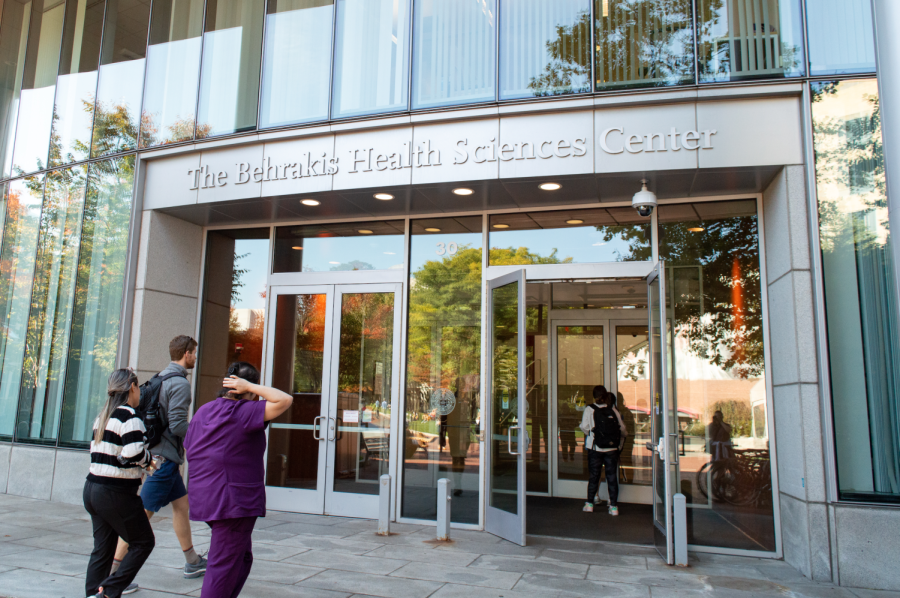New curriculum requirement for nursing students costs hundreds, creates financial burden
Northeastern’s School of Nursing, housed in Behrakis Health Sciences Center, recently introduced a mandatory test prep program for its students. In response, hundreds have now signed a petition in opposition to the new requirement.
October 17, 2022
“It is time for the School of Nursing to take responsibility for its students,” Madeline Kim, a fourth-year nursing student, wrote in her organized petition to the Bouvé School of Nursing sent Sept. 21.
The petition — signed by hundreds of nursing students as well as organizations including the NU Student Nurses Association and the Northeastern chapters of Kappa Kappa Gamma and Kappa Delta — was circulated in mid-September in response to the college’s recent implementation of Kaplan NCLEX Prep in all of the undergraduate nursing programs. Students expressed that this measure is an immense financial burden that was not communicated to them in a timely or transparent manner.
Akin to most online preparatory courses administered by commercial testing companies, Kaplan NCLEX Prep is meant to prepare enrolled students for the National Council Licensure Examination, otherwise known as the NCLEX, a nationwide examination for the licensure of nursing school graduates in the U.S. and Canada.
In the email from the School of Nursing Assistant Dean for Undergraduate Programs, Kristen Mathieu Gonzalez, announcing the instatement on Sept. 1 — less than a week before the start of fall classes — students were also notified that 5% of their final grade in most Northeastern nursing courses would be derived from exams taken in the Kaplan course, making enrollment absolutely mandatory in order to continue being a part of the nursing program.
However, the email failed to mention a crucial detail: the cost.
While noting that enrollment in the Kaplan course would cost $165 for Accelerated Bachelor of Science in Nursing, or ABSN, students, the email did not include the fact that enrollment would be $660 for those pursuing a traditional four-year BSN degree, leaving the vast majority of nursing students to find out for themselves by the time payments were due.
In an interview with The News, Kim said the financial demands of the implementation are far and many, from giving students no time to prepare for the hefty cost, to adding another out-of-pocket expense to the long list of supplemental purchases nursing students already make.
According to Kim, because nursing students at Northeastern are already being asked — during a time of rising tuition — to pay out-of-pocket for clinical uniforms, a multitude of diagnostic tests and lab packs, a mandatory NCLEX prep course by a private corporation feels like another way that students are being “lied to” about the expenses needed to allegedly benefit their education.
Lindsay Hurd, a fourth-year nursing student who also had not anticipated the extra financial burden this year, echoed the sentiment of not seeing where the nursing students’ money is going towards.
“If I’m attending this school for nursing, I want my money to be used for my education,” Hurd said. “Northeastern prides itself on innovation and being technologically advanced — you think about ISEC and all of the money they’re putting into engineering and computer science, and well, I would [also] love to be able to practice my skills in a more innovative and real-life setting, but my school isn’t providing me with the resources to do that.”
Both Hurd and Kim noted that their ability to still pay for the Kaplan course, albeit unexpectedly, is a privilege not extended to students from low-income families, who would, according to Kim, be investing “a huge chunk of money… towards Kaplan instead of putting it towards [their] own livelihood and saving for [their] future.”
On Sept. 27, Kim said Mathieu Gonzalez told her in an email that many of the supplemental costs nursing students are expected to make, including the $660 Kaplan course, are listed in the School of Nursing’s Undergraduate Student Handbook for the 2021–2022 academic year.
But according to Hurd, the prices are embedded throughout the handbook in a way that feels intentionally difficult to find, where they are only accessible if users utilize the keyboard find shortcut to type in a dollar sign. For Kim, regardless of whether the handbook explicitly states costs or not, the goal of her petition is to break the college’s cycle of instating fiscally-burdensome programs and policies despite student outcry.
Aside from frustrations rooted in financial reasons, Kim expressed to The News that Bouvé’s response is ultimately reflective of a continuous lack of emotional support and investment in students.
“I just feel like we’ve been through enough,” Kim said. “They haven’t really been supportive of the nursing students at all: our mental health [and] acknowledging that it’s difficult to be in the hospital in the middle of a pandemic working jobs where we were making $16 an hour, and they allowed that to happen.”
Despite also feeling frustrated with professors not addressing the implications of the Kaplan implementation during classes, Kim said students are more understanding that the faculty members may be caught in the middle.
In an Oct. 6 text statement to The News, an anonymous group comprised of some School of Nursing faculty and staff clarified that they share the same concerns as students against the administration.
“While faculty are doing our very best to support the students in the classroom, we, too, share their concern regarding the lack of transparency and clear communication from program administrators,” the statement read. “Unfortunately, faculty input and discussion regarding the current curricula change that is causing student angst, did not occur.”
The group also emphasized that they fully support students in taking a stand for their education.
“A Northeastern education is valuable; it is also very expensive. Students should be encouraged, and supported in providing input regarding their academic experience and financial burdens,” an Oct. 7 text statement read. “We need proper channels for students to provide such input and we should support them in this process. As developing nurses, these skills will be necessary for them to not only be strong patient advocates but to feel confident in speaking up to contribute to a healthy work environment … They cannot be ignored or pushed aside.”
For underclassmen in the nursing program, still years away from taking the NCLEX, navigating the confusion behind the Kaplan implementation takes on a new dimension.
Lusneyda Medina, a second-year nursing student, told The News that while her grade was also sent the email from Mathieu Gonzalez on Sept. 1, the underclassmen’s primary concern was whether they would have to enroll in the preparatory program every semester until graduation — a greater financial burden than the fourth-years are facing.
Medina, who is paying $165 for the course this semester, alleged she was told by her professor that not only would an extra $500 be added onto the price tag in her fourth-year, but that as long as the Kaplan course is integrated into the final grade of their Northeastern course, second-years will indeed be required to enroll in the course for as many semesters as it takes until graduation.
In an Oct. 14 email to the undergraduate nursing programs addressing recent student concerns, Mathieu Gonzalez clarified that students will not use Kaplan the semesters they are on co-op, and therefore will not receive a bill for those semesters. As such, prices for second and third-years on co-op will be adjusted, the email said.
Medina said there is an overall feeling of confusion amongst the second-years as to why the mandatory measure is being extended to their class.
“It makes no sense for us to have to buy this entire complex course with super in-depth information when we’re just getting into the fundamentals of nursing,” she said.
According to Kim’s petition, Bouvé’s reasoning for implementing the mandatory Kaplan course is to increase NCLEX pass rates, which have been allegedly lower than usual. She notes that while increasing pass rates should be the college’s responsibility, the administration may be overcompensating by requiring second and third-years to start preparations early.
“As a second-year you’re [still] building your foundation in nursing skills,” Kim said. “I understand they want to get their [NCLEX] pass rate up but … I don’t really think the responsibility should be placed on the students, especially not second-years and third-years who are very far away from taking the exam — it feels very overzealous.”
Mathieu Gonzalez also noted in her Oct. 14 email that while the preparatory course has been implemented in the BSN program for years, it was only used in the Senior Practicum. Moving forward, she wrote, “the course will be integrated throughout the curriculum during [the] four semesters students are enrolled in the BSN program and not on co-op.”
“This is the way Kaplan designed the preparatory course to be used,” Mathieu Gonzalez wrote regarding the changed timeline.
Ultimately, some students, regardless of grade level, feel they are being stripped of their own choice in how to prepare for the licensure exam.
While Kim said she would not label the students’ collective action as a “protest,” she expressed that this call for attention and action from the college is long overdue.
“I think I should be allowed to advocate for change and have a voice in what happens to me as a student, because in nursing — a lot of times lately — we have not had a voice, and we’ve just been asked to continually spend money, and that’s where it reached the breaking point,” Kim said.


















